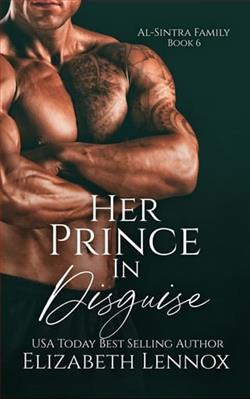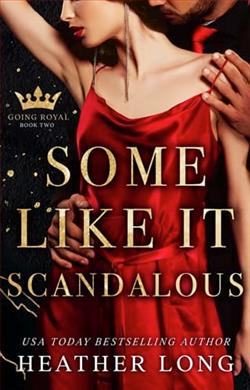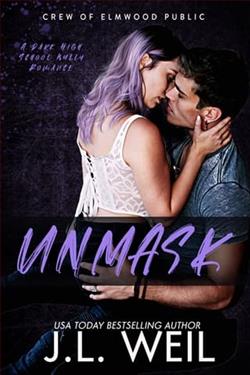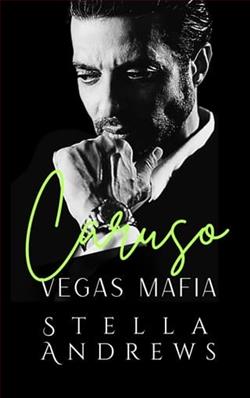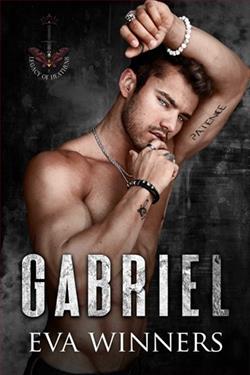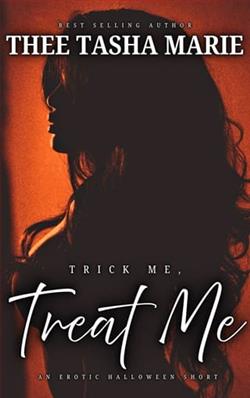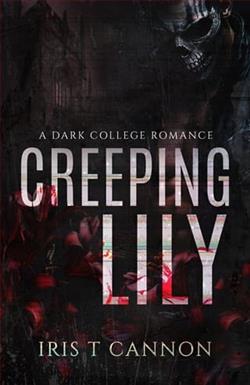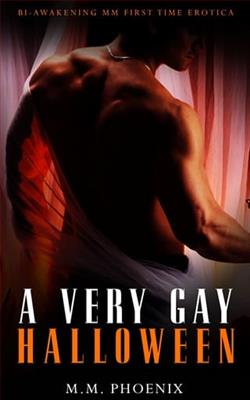Page 3 of Like a Love Story
“I figured,” he says. “You look like a strong, self-sufficient person.” There’s a hint of a smile on his lips. “I’ll be watching you from afar though, just to make sure you’re okay.” He smiles bigger now, and then adds, “I’ll always have my eye on you.” He says it like a threat, and I know it is.
When he leaves, I close the door and put a chair in front of it. I need privacy. I find the yearbook the school sent me. It’s on my bookshelf, where it sits next to the summer reading I had to do (Maya Angelou, Bram Stoker, George Orwell) and the Homer books I will be reading this fall. I quickly flip through the yearbook, scanning the small square black-and-white photos of my new classmates. Most of them look shockingly similar, the boys with their collared shirts and side-parted hair, and the girls with their ponytails and pouts. I notice a girl named Judy who looks so different from the rest,with heavy eye makeup and a piercing gaze, and I think that it’s nice someone else at the school doesn’t belong.
But I’m looking for Art Grant. I go to theGs, but at first I don’t find him, until I realize Art must be a nickname. He’s listed as Bartholomew Emerson Grant VI, and he’s very hard to miss. His hair is shaved at the sides, and a soft Mohawk at the top sways toward the right side of his face, which is turned slightly, probably to reveal the earring in his left ear. He has a smirk on his face, like he knows exactly what people are thinking of him, daring anyone looking at this picture to call him a fag again, telling the Saadis of the world to go to hell. Even in black and white, his eyes look like a cat’s, defiant, challenging you. My mom once told me that no matter where you stand, you’ll think the Mona Lisa is looking right at you. That’s how I feel about this picture. Like Art is looking right at me. Like he sees me.
I quickly close the book, overwhelmed by his image, but his face haunts me. I cannot stop thinking about him, and his shaved scalp, and his studded ear, and his devilish lips. I need to stop thinking about him, and I know there’s only one way to do that. I lie back on my bed, close my eyes, and unzip my pants. I see Bartholomew Emerson Grant VI come to life, enter my room, climb into bed with me. He kisses me, undresses me, tells me not to be scared. But then he’s gone, and all I can see are images of dying men with lesions.
I hate myself. I hate these thoughts. I hate Bartholomew Emerson Grant VI.
I close my eyes tighter, and my breath quickens. When it’s over, I breathe out all the air inside me, hoping that with the last bit of oxygen leaving my body, this sickness will leave me too. I know this is a phase. It must be. I grew out of needing my stuffed rabbit with me all the time. I grew out of hating eggplant, and of putting McDonald’s french fries on every Persian stew my mom made. I will grow out of this. I must, because I cannot ruin my mom’s new marriage. And because even though my mom can handle anything, I don’t know if she can handle me dying.
I need to live, and to live, I can’t ever be what I know that I am.
Art
It’s the irony that hits me first. That I have never felt more alive, while I’m surrounded by people who are dying. In a city that feels completely segregated, this community center is overflowing with people of all races, ages, genders, and income levels. Bankers and dancers, all in one place, with one purpose. To fight the power, to screw the system, and to show the presidents and CEOs of the world what we’re made of. There’s nowhere else in the city with this much energy in it, nowhere with this much color, this much diversity. Maybe death is the great equalizer. Except it’s not. Because gay people seem to be doing most of the dying. My people. The final irony, that here in this place, it’s okay for me to be gay. I try to be gay at home, but with my parents’ judgment and denial, and all those photos of Ronald and Nancy Reagan staring at me from within their silver picture frames, it doesn’t work out so well. At school, the starched gray-and-navy-blueuniforms they make us wear basically tell us to conform to heterosexual norms, OR ELSE. Here in this room, I don’t need to be gray and navy, I can be a proud-ass rainbow.
“There’s a new report out,” a woman says. She’s super tall, her hair is buzz-cut, and she wears overalls and a black bra, which makes me love her already. She looks like the kind of woman who could play Molly Ringwald’s best friend in a prom movie. I pull my camera up from around my neck, where it’s pretty much always dangling, and I snap a photo of her. She speaks with an edge to her voice, a tremble of anger and fear. “It’s hidden in the back of the newspapers, of course. They don’t like putting our stories on the front page. It says teenagers are the plague’s newest victims.Teenagers.”
The eyes of the room turn to me and Judy. Almost three hundred people are massed in this dingy space, but we’re the only teenagers. And fabulous ones, too. Judy’s wearing a frayed azure-blue top over striped leggings with combat boots. She designed the outfit herself. Like with a sewing machine. She’s brilliant that way. She jokes that the reason she’ll make it as a fashion designer someday is ’cause AIDS is wiping out her competition, but that’s not why. It’s ’cause she’s beyond talented. We keep our eyes on each other. “Oh God,” Judy whispers to me. “Please tell me they’re not going to make us speak.”
“Our whole culture is in severe denial,” the overalls lady continues. “TEEN. AGERS. They are out there having sex. And nobody is talking to them about therisks. We need to protect them!” When she says the wordteenagers, she says it with a level of passion that scares me, like there’s something about being a teenager that’s so intense that the word needs to be spoken like a warning.
“I guess this is one advantage to the fact that no one wants to sleep with us,” Judy whispers. “We won’t get AIDS.”
Judy and I haven’t made a celibacy pact or anything, though that’s what our parents and our sex-ed teacher have recommended. It’s just the reality of our situation that there are ZERO romantic prospects in the world for us, which has the benefit of making us each other’s everything. I’m the only out gay kid in our whole school, and Judy isn’t exactly the kind of girl most guys go for, though she has certainly pined for a few. I think she’s gorgeous, of course. She looks like a cross between Cyndi Lauper and a Botero painting. But as she often says, gay guys finding her gorgeous doesn’t do much for her. Also, she’s allowed to make AIDS jokes ’cause her uncle Stephen has AIDS and makes AIDS jokes all the time. He says he’s too close to death NOT to make fun of it.
“Speak for yourself,” I say. “The whole basketball team wants to sleep with me.” I pause for dramatic effect, and then add, “They just don’t know it yet.”
Judy smiles and swats my shoulder, which is bare thanks to the tank top I’m wearing, purchased at the merch table at a previous meeting. Judy and I have been coming to these meetings for a few months now. At first, Stephen wouldn’t let us come. But we begged, and wegot our way. He still hasn’t let us go to an actual protest, but we’re working on it.
“Shut up,” Judy says. “We are at a serious gathering of serious people discussing a serious issue aboutTEEN. AGERS.”
Judy’s uncle Stephen stands up, adjusts his shawl, and clears his throat. He’s high drama, and we love him for it. Once upon a time, he was also the most handsome, charismatic man I had ever met. Now he looks like a ghost. But at least he’s still alive. His lover, José, is gone, as in not with us anymore, as in deceased. The hospital threw his body in a GARBAGE BAG when he passed. He’s one of the ninety-four friends Stephen has lost to the disease. He keeps a list. He also keeps a pot of jelly beans and adds a jelly bean to the pot every time someone dies. He says that just before he dies, he will eat every one so that his friends will be with him. As he begins to speak, I snap a photo of him. “What about an action at the department of education?” Stephen asks. “We could demand a change in their sex education policies. We could demand condom distribution. We could dress up like librarians. I have the perfect blouse!”
Another man—thin as a rail with hollow cheeks—stands up. “We don’t have the time or the resources to be distracted,” he says. “We know who the real enemy is. The price of AZT is obscene. We have our plan, and it’s going to need all our attention.”
“Well, that’s what affinity groups are for,” Stephen says. “And I’m on board with our plan. Like all of you,I’m ready to risk getting arrested... again.”
There’s some laughter in the room, solidarity in the number of times they’ve all been booked and released. That’s the way it usually works. ACT UP members are given civil disobedience training, and they’re usually released without being put through the system. But there have been exceptions, and no one wants to be that exception. I see a man in a leather jacket in the corner of a room eyeing a handsome young dancer type. They cruise each other with heat. For meetings about a deadly sexually transmitted virus, these gatherings are surprising breeding grounds for hookups. I snap a photo of the two men.
“But we also need to find a way to stop new cases,” Stephen continues. “And what better place to start than by educating young people?” He looks at Judy and me, and he adds affectedly, “Our innocent, pure young people.”
“If my face isn’t enough to scare young people into having safe sex,” the thin man says, “then I don’t know how protesting outside the department of education will help.”
He’s right. I look at his face and realize it’s the face I’ve been seeing in all my nightmares since I first understood what sex was, and since I first understood that Judy and I would never get married and have kids like we said we would, because I really do want to sleep with the basketball team. And the football team. And every member of Depeche Mode and the Smiths. I basically want to sleepwith everyone with a Y chromosome. But this man’s face—gaunt and covered in caked-on concealer doing a poor job of hiding purple lesions—is the face that stops me from acting on any of my abundant desires. It’s the face my dad and I were looking at five years ago when we were sitting outside one of those awful French bistros where all the men wear identical suits and all the women wear dead animals on their backs. One of those faces walked by us, leading a poodle on a leash, and my dad looked at it—the face, not the poodle—with a grimace of disgust and said, “They deserve it, you know. Maybe when this is all over, we won’t have any more of them in the city. Maybe even in the world. Wouldn’t that be something?” And then the face walked away, leaving me and my father alone, steak frites in front of us and a new barrier in between us.
How was he supposed to know that only a few months before, I’d had my first wet dream, about Morrissey? How was he supposed to know that I had discovered—after a childhood spent assuming I was just like others—that I was not only different but despised? That he had just suggested the world would be a better place if his own son dropped dead after a few years of lesions, diarrhea, and blindness? I wanted to reach over and strangle him. To exterminate him and anyone with that kind of hate in their hearts. I could see the headlines—Old Money! New Scandal! Greedy Banker Killed by Effeminate Son. Revenge of the Gay: Son Brutally Strangles Father. But I didn’t kill him. I just ate my steak in silence and listened as he told meabout his latest trades.
“We do have two teenagers here with us,” Stephen says, pointing to me and Judy. “My beautiful niece Judy, and her best friend, Art. Not to put them on the spot or anything, but maybe they could tell us something about their experience.”
“We have no experience!” Judy says, way too boisterously. “Not in that department, I mean. None. Nada. We’re basically Doris Day and Sandra Dee.”
A man in the corner with fuchsia hair says, “And even if they had experience, do you think they’d want to tell a roomful of grown-ups including their uncle? Have you forgotten what being a teenager is like?”
“Bite your tongue,” Stephen says. “I only just turned nineteen.” When he says this, he sounds like he’s in one of his melodramas. Stephen loves old black-and-white movies. It’s funny, ’cause he’s the most colorful person I know. He’s brighter than color. He’s Technicolor.
“I have something to say.” That’s me talking. My palms are sweaty, and my voice shakes. “I, um, it’s about something that I think is, um, super important. It’s just, well, I think that there’s something that would be missing even if the department of education spoke to teenagers.” I pause for a long time, and Stephen gives me a nod of support. “It’s the parents,” I finally say. This is it, the gist of what I want to say, and once I start, I can’t stop. “It’s the parents who have to change first. Because so long as parents are telling their kids that being gay is a sin, or that this disease is God’s way of killing gay people, orthat celibacy is the only way not to die, or that they can get it from sitting on the wrong toilet seat, then nothing else matters. Because teenagers, well, I mean, we don’t tell grown-ups what we do because we already know how they’re going to react. We already know that they’ll either pretend we never said what we said or they’ll ground us or blame us. And you know, most people don’t really have parents like you.”








